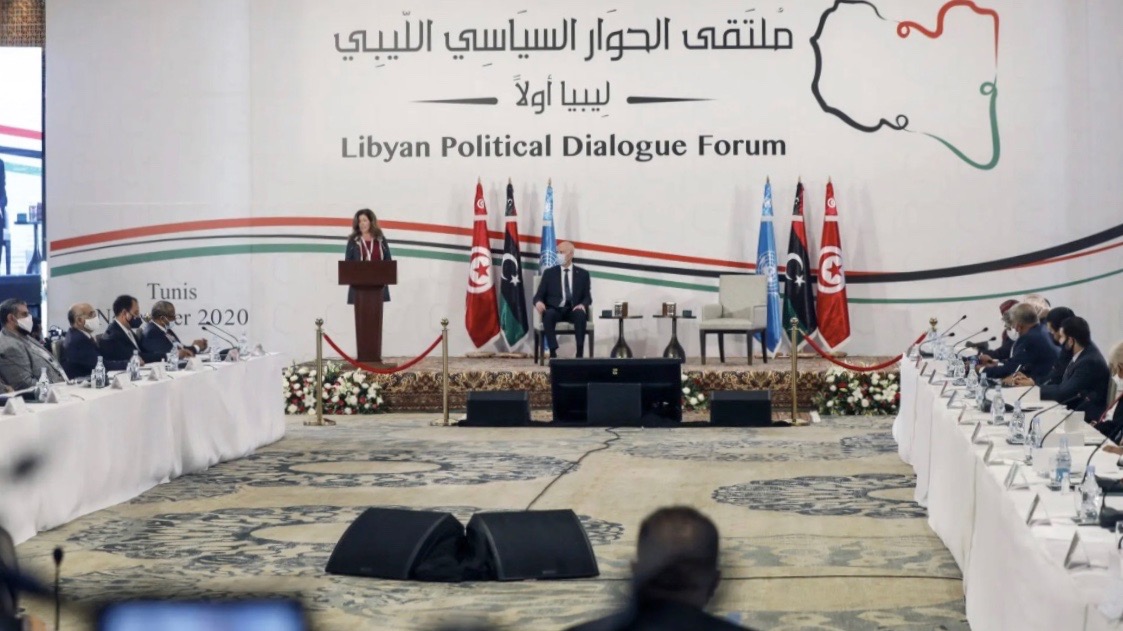Libya’s warring parties have once again resumed talks to resolve their political differences and reach a settlement to end the war and civil strife in the country. The talks held on Wednesday, August 11 took place via video-conferencing under the supervision of the United Nations Support Mission in Libya (UNSMIL). The negotiations were held keeping in mind the scheduled December 2021 presidential and parliamentary elections in the country which has been ravaged by war, foreign military interventions and civil conflict. The meeting between the parties, referred to as the Libyan Political Dialogue Forum (LPDF), comes on the heels of six weeks of failed talks that were being held in Geneva, Switzerland, in which the 75 Libyan representatives were unsuccessful in reaching a consensus on a constitutional framework to govern the upcoming elections.
Attempts at reaching a negotiated compromise by various parties which have long standing and varied political and tribal differences first began last year in October when the warring sides agreed to a ceasefire and talks. The talks eventually led to an agreement on forming a transitional government to govern Libya in the interim period before the proposed elections and to oversee the organizing and conduct of the elections. The agreement also led to a much needed cessation of violence, especially between the two biggest and most significant of the Libyan factions – the UN-recognized Government of National Accord (GNA) based in capital Tripoli which is supported by Turkey and the eastern-based government of the House of Representatives and Libyan National Army (LNA) led by rebel general Khalifa Haftar which is supported by Russia, Egypt and the United Arab Emirates.
Libya, with one of the world’s largest oil reserves, has been in a state of war and chaos since the 2011 US and NATO-backed overthrow of former leader Muammar Gaddafi, leading to a rise in extremism and terrorism in the North African country. Subsequent intra-country divisions and infighting among opposing forces prolonged the violence and civil conflict, which simultaneously assumed a geopolitical nature with various foreign powers picking sides and financially and militarily contributing to sustaining and even escalating the violence. Thousands of foreign fighters and mercenaries entered the country on the behest of foreign powers to take part in the fighting on their respective sides. The UN estimates that there are approximately 20,000 foreign fighters in Libya, but unofficial figures suggest that the number could be much higher. The ceasefire agreement that was reached last year between the various Libyan sides stipulated the removal of all foreign fighters within 90 days, a condition that remains to be fully met, besides other conditions aimed at ending the violence and building confidence between the warring sides.
During the conference yesterday, the head of the UNSMIL, Jan Kubis, in his opening remarks urged all the stakeholders and parties in the country to find common ground and use their political will to “move past your differences, live up to your responsibilities, and focus on the most important objective which is to develop a constitutional framework for free, fair, transparent, and inclusive elections.” He also warned that “LPDF’s lack of ability to reach an agreement risks resulting in depriving once again the Libyan people of their right to democratically elect their representatives and restore the long-lost legitimacy of Libyan institutions. It also risks putting into question the LPDF standing, credibility, and relevance.”





